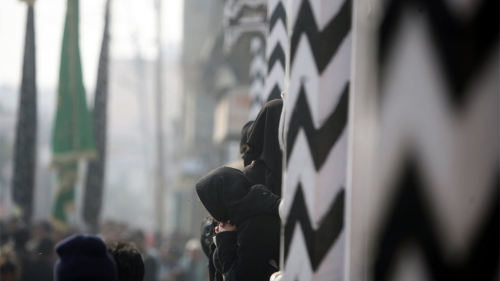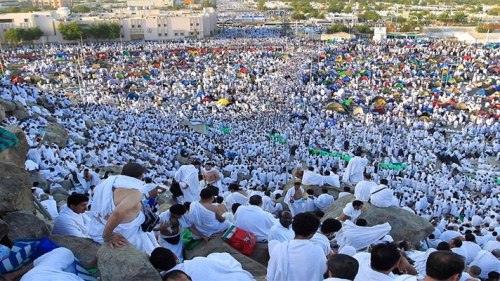Siyaam in Far Northern and Southern Regions of Earth

Recently in an article on Islamcity.com: "Ramadan Fasting Challenges Arctic Muslims", several solutions have been mentioned to 23 hour long days such as fast in autumn, fast as in Makkah and Madinah, cannot forgo fasting, fast as in closest Muslim country, go on vacation to old country during the month of Ramadan, etc. It was also suggested that people could choose the fasting period for themselves thereby taking out the role of the jama'ah (community) from the equation. Of course, 23 hour long nights are also a matter of concern when performing salah (daily prayer) or siyam (annual fasting in Ramadan). I thought I would reflect on this matter. My points are:
1. There is at least one narration that during the time of the Prophet (peace be upon him), some people, out of excessive piety, would want to fast back-to-back without eating. He absolutely forbade it.
2. Going on vacation to parents' old country would certainly not be an option for Swedish reverts. Also, it may not be such easy option for the rest.
3. Doing Ramadan in autumn or spring is an option, but it isolates the Ramadan spirit.
4. Verse 2:185 says that Allah wants ease on this month and not hardship so as to fast. It also allows people to make up fast if they are travelling or sick. So exceptions are possible. The issue is that this situation has not been mentioned as an exception. Could Muslims use ijtihad (independent thinking) to resolve this matter? It is allowable and oft-used tool in Sharia'ah (Islamic Jurisprudence)? There certainly is a serious risk to health if fasting is stretched over too long a period. What should be the cut-off point beyond which an average person faces risk to health or life when fasting back to back for an extended period of time and when first-time fasting youth could find it well nigh impossible? It is to be decided by the Ulema and practicing Muslim physicians.
5. By fasting in autumn or spring, one is already essentially stepping out of Ramadan and "violating" the ruling on fasting (2:183). So, why not "violate" the ruling in Ramadan and use the shorter day of Makkah or Madinah or that of the closest Muslim country or, if I may add, the duration of day as in latitude 23.5 degree north or south depending on whether the day is either too short or too long?
6. Also, the first hadith (saying of the Prophet) in the collection Sahih Al Bukhari says that everything hinges on niyah (intention). So, if a person does not intend to cheat on fasting which anyway is not possible because Allah is ever watchful (Raqiba), then more normal hours may be adopted.
7. Also, in 10:67, Allah (God) clearly states that the night and the day are for resting and work. This pattern works ideally for people around some margin of the equator where most of humanity lives. The five daily prayers are designed around our wakeful hours. So, while the Sun may be used as our daily clock, it only works in certain instances around the equator. There is thus a utilitarian value in sunrise and sunset with certain limitations.
8. Muslim claim Islam to be simple and practical. And, in verses 14:33, 17:12, and 27:64, for example, we are told that nature is essentially serving man. In this case, it would appear that nature is not agreeable with normal human life. And that is not a surprise when you think that the earth is a like a ball and its source of light and heat is just one and is in front of it, not on top or bottom. But then neither are deserts, equatorial forests, mountains, deep seas, or deep space conducive to normal human life.
9. Also, the Quran recognizes the variation in the seasons (2:164) and the associated variation in the length of day and night (3:27). However, it makes no exception in the length of a fasting day for such variations. However, the polar days or days beyond 23.5 degree latitudes, say, have not been directly referred to. But the exceptions mentioned earlier including intention of the worshipper, facilitation of normal daily life, ease in practicing faith, the Prophet's edict against foodless continuous fasting, the possibility of exception in the Shari'ah, etc., build a body of circumstantial evidence that should allow for shortened fasting in Ramadan in such far flung northern or southern regions.
10. Ideally, it should be a communal decision. It should not be approached on separately as individualized decision. While fasting is for an individual to do, it is a month that covers all Muslims. So, it is a communal act. The iftar (breaking fast) and the suhoor (starting fast) are communal with family and friends. The Eid celebration is certainly communal. While Fasting is obligatory, but starvation or physical endangerment is not allowed for at least one good reason - it is not sustainable. To this end, finally another hadith may be paraphrased. It is pleasing to Allah that a person does something good consistently or regularly even if it is a very small thing (Bukhari and Muslim; narrator - Ayesha (r)). Worshipping in fits and starts, therefore, is not what is desired because worship benefits man and not Allah. Irregularity in worship will produce very little positive benefit for man.
*****
Dr. Shafi A. Khaled is a freelance writer. He teaches and does research in Business & Economics.
Topics: Fasting (Sawm), Nature And Environment, Ramadan
Views: 3218
Related Suggestions
95:8 Is not Allah the wisest of judges?

















